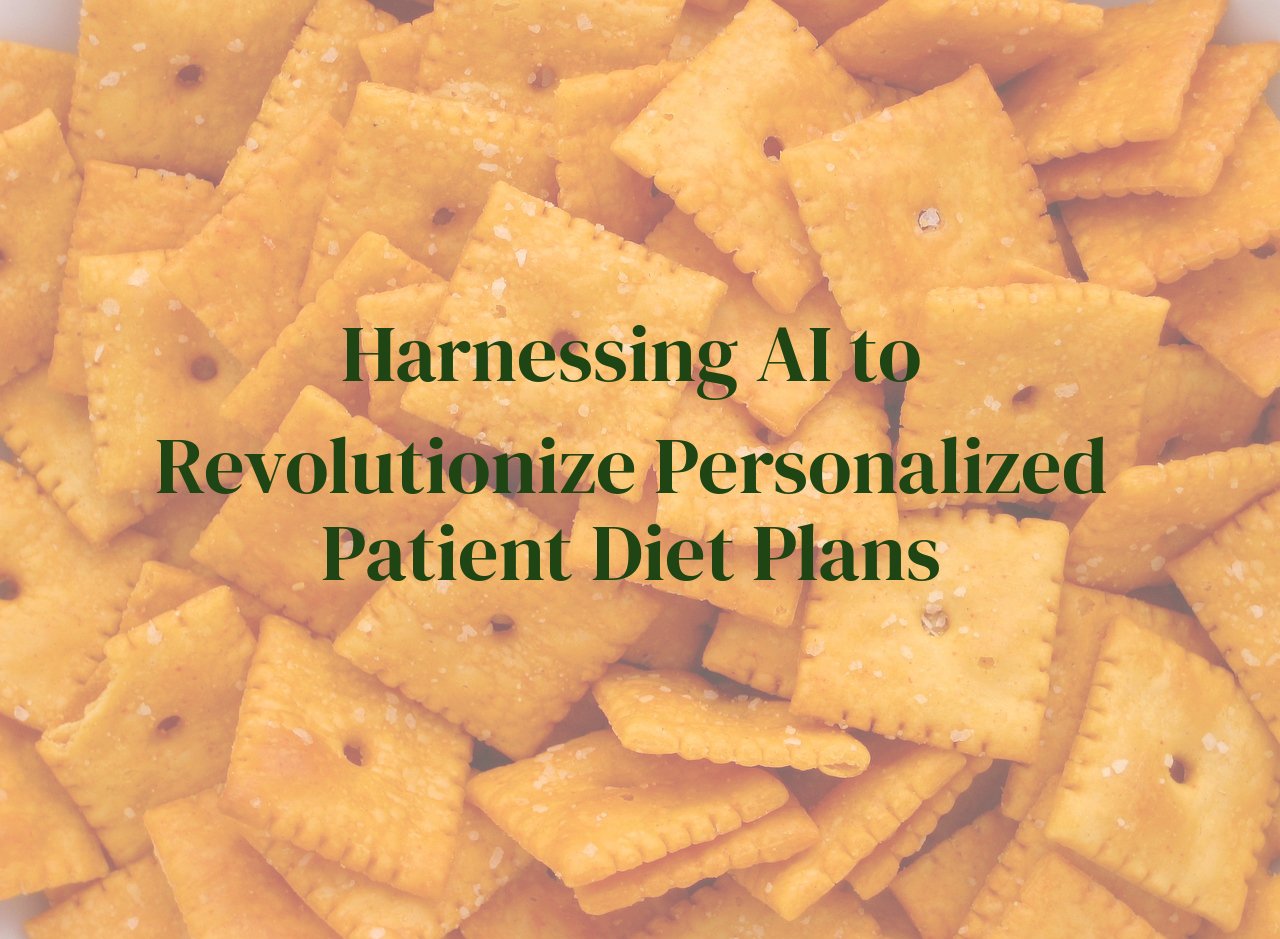
In this blog post, we are diving into the fascinating world of artificial intelligence and its transformative role in personalizing patient diet plans. We will explore how AI-powered tools are crafting individualized nutrition blueprints and redefining dietary therapy in healthcare.
Readers will gain deep insights into the mechanisms behind AI-driven diet optimization, real-world applications, and direct benefits for both healthcare professionals and patients. Whether you’re a healthcare provider aiming to enhance patient outcomes or someone keen on how technology can improve health, this post is packed with valuable information.
Table of Contents
How AI Understands Nutritional Needs
As a healthcare professional, I have witnessed incredible advances in personalized nutrition therapy. Artificial intelligence (AI) is at the forefront, transforming how we approach and understand nutritional needs.
First, AI gathers a vast array of data, including genetic information, medical history, lifestyle choices, and even real-time dietary intake. By integrating this data, AI creates a comprehensive nutritional profile for each patient, allowing healthcare providers to develop highly personalized diet plans. It is no longer a one-size-fits-all approach.
One fascinating aspect is how AI uses genetic markers to predict nutritional needs. For instance, some individuals may have genetic variations affecting their ability to metabolize certain nutrients. AI can analyze these genetic factors and suggest dietary adjustments to address potential deficiencies or excesses.
Moreover, AI excels at pattern recognition. By analyzing patients’ dietary habits and health outcomes, AI identifies patterns and correlations that might go unnoticed by humans. This ability helps in fine-tuning diet plans to meet individual health goals, whether it’s weight loss, improved energy levels, or management of specific conditions.
Another remarkable feature is AI’s ability to process and learn from new information continuously. This adaptability ensures that the nutritional recommendations evolve with the patients’ changing health status. For example, if a patient develops a new condition or experiences a significant life event, AI can quickly adjust the dietary plan accordingly.
In my practice, I have seen AI streamlining the process of dietary assessment. What used to take hours of manual input can now be accomplished in minutes, with even greater accuracy. This efficiency allows us to focus more on patient engagement and education, which are crucial components of successful dietary therapy.
Ultimately, AI doesn’t replace the human touch; it enhances it. By providing unparalleled insights and precision, AI empowers healthcare professionals to deliver better, more targeted care. As we continue to unlock the potential of AI in understanding nutritional needs, the future of personalized nutrition therapy looks more promising than ever.
Real-Time Dietary Adjustments Through AI
One of the most compelling advancements in contemporary healthcare is the ability of AI to make real-time dietary adjustments for patients. Imagine a world where your diet isn’t just planned in advance but continuously tweaked on-the-go based on your immediate needs and changes in your health status. This isn’t a futuristic fantasy; it’s rapidly becoming a reality.
AI can utilize continuous glucose monitors, wearable devices, and even smart kitchen appliances to track various physiological parameters like blood sugar levels, heart rate, and activity levels in real time. For instance, if your blood sugar level spikes unexpectedly, the AI system can recommend an adjustment to your meal plan, such as consuming a certain amount of fiber or protein to stabilize your levels. This swift intervention can prevent complications and promote better overall health.
Moreover, these real-time adjustments extend beyond just immediate health metrics. AI can analyze your daily activities, including your exercise routine, sleep patterns, and stress levels, to adjust your diet accordingly. If the algorithm detects you’ve had a poor night’s sleep, it might suggest eating foods rich in tryptophan to improve sleep quality, or if it notices high stress levels, it might recommend foods high in magnesium to help calm the nervous system.
This real-time adaptability also proves invaluable for patients with chronic conditions like diabetes, heart disease, or kidney disorders. Personalized alerts and meal recommendations can be sent directly to your smartphone, ensuring you’re always one step ahead in managing your health. For instance, an AI system might detect early signs of an impending hyperglycemic event and prompt you to consume a quick-acting carbohydrate to counteract it.
Another astonishing application is the integration with smart home ecosystems. Your AI-driven fridge can track the nutritional content of the ingredients you have at home and suggest recipes that fit your dietary needs while ensuring minimal waste. It’s like having a dietitian and chef right in your kitchen!
From my personal experience working with AI-driven dietary systems, I’ve seen firsthand how these technologies can transform patient’s lives. One case that stands out involves a young woman with Type 1 diabetes. Traditional methods of diet control were stressful and required constant monitoring. After transitioning to an AI-based system, she found it considerably easier to manage her condition. Real-time alerts and dietary recommendations tailored to her immediate glucose levels and activity patterns led to a significant improvement in her quality of life.
The Role of Machine Learning in Patient-Specific Diet Plans
One of the most compelling aspects of artificial intelligence in personalizing patient diet plans is the integration of machine learning algorithms. As these algorithms process vast amounts of data, they become increasingly adept at tailoring diet plans that are finely tuned to individual needs.
Through machine learning, healthcare providers can parse and analyze a patient’s medical history, genetic makeup, and current health status to create highly personalized nutritional recommendations. Imagine a patient with a history of high blood pressure and a genetic predisposition to diabetes – a machine learning model can synthesize these factors and suggest a diet that minimizes risks associated with these conditions.
Another fascinating facet is the ability to predict future health events. For instance, machine learning can identify patterns in a patient’s diet and activity levels, potentially forecasting future episodes of illness. Preventative measures can then be recommended long before a crisis occurs. This proactive approach not only enhances patient wellbeing but also reduces the strain on healthcare systems.
From my own experience as a healthcare blogger, I have seen how machine learning can digest mountains of nutritional studies and real-world patient data to deliver insights that are almost impossible for human practitioners alone to uncover. This rich tapestry of data uncovers correlations that might otherwise go unnoticed, offering groundbreaking prospects for personal health management.
Additionally, machine learning models can continuously adapt and refine their recommendations based on new data points. For example, as a patient logs their meals and exercise routines, the model can make real-time adjustments to their diet plan, ensuring that nutritional needs are met without overwhelming the patient. This dynamic feedback loop is a revolutionary step away from static diet plans of the past.
Of course, the human touch remains irreplaceable. Health professionals can use these machine learning insights to offer more nuanced advice and emotional support, bridging the gap between data-driven recommendations and patient engagement. The symbiosis of machine learning prowess and human expertise promises to unlock unprecedented avenues in personalized nutrition therapy.
AI and Chronic Disease Management: A New Hope
In my years of exploring the nexus between technology and healthcare, one area that continually dazzles me is the use of Artificial Intelligence (AI) in managing chronic diseases. This isn’t mere tech geekery; it’s palpable progress. For patients battling chronic conditions like diabetes, hypertension, and heart disease, AI offers a lifeline steeped in personalized nutrition therapy.
Firstly, AI’s predictive analytics can significantly mitigate complications. Take diabetes, for example. Using machine learning algorithms, AI can analyze a patient’s glucose readings, dietary habits, and activity levels to forecast blood sugar spikes. Such predictions enable timely dietary adjustments, reducing the risk of long-term complications. I’ve seen this firsthand: one of my acquaintances significantly stabilized his blood sugar levels by leveraging AI-driven dietary suggestions tailored to his unique metabolic responses.
Moreover, AI can integrate seamlessly with wearable technology, providing real-time dietary advice. Imagine a patient with hypertension wearing a smartwatch that monitors their blood pressure. The AI can analyze fluctuations in real-time and suggest immediate dietary tweaks, like reducing salt intake or increasing potassium-rich foods, thereby preventing potential hypertensive crises.
Secondly, AI does more than just crunch numbers; it offers emotional intelligence. Virtual diet coaches are now capable of not merely offering diet plans but encouraging patients through gamified eating experiences. I remember speaking with a patient with heart disease who felt more motivated to stick to his diet regimen because his AI assistant turned meal planning into a rewarding game. The human element, blended with tech efficiency, creates an unprecedented support system.
Possibly most fascinating is AI’s ability to adapt over time through continuous learning. A patient with a chronic disease isn’t a static entity; their disease profile evolves. AI’s adaptive learning algorithms can recalibrate dietary plans in response to new data, making dietary therapy not just a one-time solution but an evolving companion.
The amalgamation of AI and chronic disease management isn’t an abstract concept but a reality making waves. It signifies a beacon of hope for countless individuals burdened by chronic conditions. Personalized nutrition therapy, powered by AI, offers an intricate blend of technology and empathy, making healthcare more accessible and effective.
Future Prospects of AI in Personalized Nutrition Therapy
The future holds incredible potential for AI-driven personalized nutrition therapy. As technology evolves, AI systems will continue to improve in precision and adaptability, ensuring diet plans are tailor-made to fit the unique needs of each individual. From identifying micronutrient deficiencies to predicting long-term health outcomes based on dietary habits, AI can open doors to a healthier, more informed life for many.
One of the most exciting prospects is the integration of AI with wearable technology. Imagine a scenario where your smartwatch not only tracks your physical activity but also monitors your dietary intake and provides real-time feedback. By syncing with AI algorithms, these wearables could continuously adjust nutrition recommendations based on your immediate and long-term health metrics.
Additionally, AI could bring about significant advancements in preventive healthcare. By analyzing massive datasets, AI can identify patterns that humans might overlook. This means that personalized nutrition plans could become a preventive tool, helping to reduce the risk of chronic diseases before they manifest.
Furthermore, the advent of AI-powered virtual nutritionists and dietitians is becoming a reality. These virtual assistants can offer 24/7 support, answering dietary questions, suggesting meal plans, and even providing emotional support for those who struggle with diet adherence. This accessibility can bridge the gap for people who might not have regular access to healthcare professionals.
From a research perspective, AI can accelerate the pace at which we understand the complex interactions between diet, genetics, and overall health. Machine learning models can process vast amounts of data from diverse populations, leading to more accurate and inclusive dietary guidelines that reflect the needs of different demographic groups.
Another promising avenue is the personalization of dietary supplements. AI can analyze individual biomarkers and recommend specific vitamins, minerals, and other supplements that are tailored to one’s genetic make-up and lifestyle. This could revolutionize how we approach nutritional deficiencies and overall health optimization.
As we look forward to these advancements, it is essential to address potential ethical considerations. Ensuring data privacy and preventing algorithmic biases are critical to building trust in AI-driven nutrition solutions. Developers and policymakers must collaborate to create robust frameworks that protect user data while promoting innovation.
Reflecting on my personal experiences as a healthcare blogger, I have seen firsthand how technology can transform lives. Clients who once struggled with generic diet plans now find relief and improved health outcomes through customized AI-driven recommendations. The emotional and psychological benefits of knowing that a diet plan is specifically designed for you cannot be overstated.
In conclusion, the future of AI in personalized nutrition therapy is bright and multifaceted. As technology continues to evolve, we can expect more precise, effective, and accessible dietary interventions, ultimately leading to a healthier global population.
Conclusion
The integration of artificial intelligence in personalizing patient diet plans signifies a groundbreaking evolution in healthcare. By leveraging AI, we not only improve nutritional precision but also enhance patient’s quality of life.
As technology advances, we anticipate even more sophisticated and user-friendly AI applications in dietary therapy. Embrace the future of personalized nutrition with a blend of technology and care.



